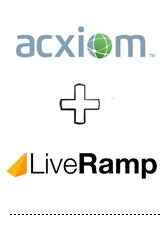 Data management firm Acxiom will acquire LiveRamp, provider of a data onboarding software used by many in the advertising industry to match offline data to digital audiences for ad targeting and measurement. The deal is worth $310 million and is expected to close mid-summer, the companies said.
Data management firm Acxiom will acquire LiveRamp, provider of a data onboarding software used by many in the advertising industry to match offline data to digital audiences for ad targeting and measurement. The deal is worth $310 million and is expected to close mid-summer, the companies said.
Taking up with Acxiom will let LiveRamp scale its product and expand globally, LiveRamp CEO Auren Hoffman said in a blog post.
“LiveRamp will benefit from Acxiom’s vast resources,” he wrote, “which will help us achieve higher match rates, faster turnaround times and the ability to rapidly introduce data onboarding to thousands of Acxiom customers.”
LiveRamp will remain neutral, Hoffman said. “We will continue to work with every marketing application, agency, CRM manager, data provider and VAR to help marketers connect data across every digital marketing application,” he said.
However that neutrality pledge is bound to raise some eyebrows. The acquisition suggests Acxiom wants a better way to onboard data, but the competitive benefit of buying LiveRamp is unclear if it remains open and neutral – especially to Acxiom’s most direct competitors, Epsilon and Experian.
Acxiom has made steady “matches”on its own by linking up different data sets. A February deal with eBay connected Acxiom’s access to third-party data sets with eBay’s transaction-level data to identify matches for targeting purposes.
LiveRamp will help it accelerate such deals. In August 2012 LiveRamp released GetOnboard, a CRM software designed to bridge the gap between marketers’ customer data and their online advertising efforts. The vertical focus for that product spans retail, travel, auto, telcos, financial services and publishers. LiveRamp also claims to work with most of the large third-party data companies.
LiveRamp’s $310 million exit is an turnaround from arguably rocky beginnings. LiveRamp was once a part of RapLeaf, a company that got into trouble circa 2010 for selling data inferred from public Facebook pages and referral links. At the time, The Wall Street Journal reported RapLeaf’s transmission of personally identifiable information related to Facebook and MySpace user IDs.
In 2011 the company developed the LiveRamp brand, which was later spun off from the RapLeaf corporate entity, the remnants of which were sold last October to TowerData. CEO Auren Hoffman remained at the helm of LiveRamp after RapLeaf was cut loose.
In a December interview with AdExchanger, Hoffman described the onboarding opportunity this way: “When you ask CMOs if they’ll be using their full customer databases for digital marketing within the next three years, 100% say yes, and they’ll be doing it across every possible digital platform. So our road map is all about accelerating that adoption and pushing marketers’ customer data to as many applications as we can.”
Those applications include search, email and, of course, mobile, where problems of user identification are paramount.
LiveRamp uses a Software as a Service model, charging its customers a yearly subscription based on the number of consumers in their databases.
In the Acxiom earnings call on Wednesday, CEO Scott Howe emphasised how this acquisition will benefit the “entire industry.”
“We are creating a new industry category, to power each and every participant in the marketing ecosystem,” said Howe, “For marketers and advertisers, we increase the opportunity to deliver the right message to the right person through the right channel. For technology providers, we help their customers extract more value out of their solutions. For publishers and media providers, we make their audiences more accessible and profitable. Consumers win through better advertising and more connected experiences.
Howe spoke to one more constituency, saying, “To LiveRamp’s base of over 200 customers, let me assure you that you will continue to receive the same unbiased services. This deal excellerates LiveRamps ability to expand internationally.”
However, it remains to be seen if Acxiom competitors who also use LiveRamp’s technology will embrace this news.
Read the press release.
Zach Rodgers and Joanna O’Connell contributed.











